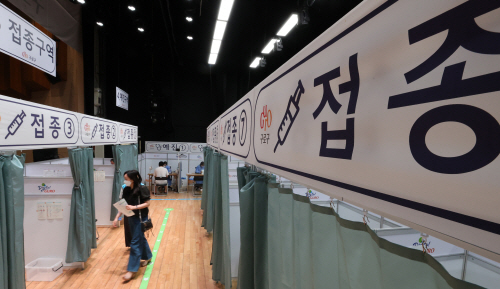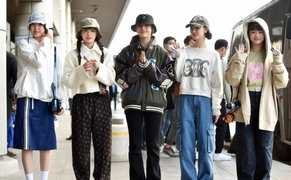 |
| A woman enters the vaccination room at a vaccination center in Guro District, Seoul, on August 10, 2021./ Source: Yonhap |
AsiaToday reporters Lee Sun-young
While many believe that vaccination rollout would curb the spread of COVID-19, distrust is growing over efficacy of COVID-19 vaccines. The government’s vaccination program has been going smoothly, but the number of confirmed cases has been increasing, raising public distrust over the vaccines. Experts are calling on people to participate in the government’s vaccination program since vaccines remain effective at preventing severe illness and death.
South Korea reported 1,987 cases for Thursday, raising the total caseload to 218,192, according to the Korea Disease Control and Prevention Agency (KDCA). The daily infection caseload fell below the 2,000 compared to the 2,222 cases for Wednesday, but many say it remains to be seen whether the spread of the virus has been slowing down.
The government has been making all efforts to get people vaccinated as forming herd immunity through vaccinations has been suggested as a key solution amid few signs of a slowdown despite weeks of the toughest Level 4 measures of the nation’s four-tier social distancing regulations. Since the mass vaccination was launched in February, the country has administered COVID-19 vaccines to total of 21,813,171 people, which is 42.5% of the total population. The government aims to inoculate 70% with at least one shot by September.
However, some are showing distrust over vaccines and even claiming that vaccines are useless. This is because vaccines do not prevent you from getting infected, and there is a growing number of side effects of vaccination, such as breakthrough cases or the death toll, raising public anxiety.
The proportion of the Delta variant in local COVID-19 infections in the first week of August CAME TO 73.1%, sharply up from 61.5% a week earlier, the KDCA said. Of the more than 6.5 million people who have been fully vaccinated, 1,540 were breakthrough cases as of Aug. 5.
“Quite a number of people have been vaccinated, but the number of confirmed cases continues to increase,” said a 24-year-old Seoul resident surnamed Park. “I don’t know why I have to get vaccinated if you can get infected anyway.”
Overseas studies suggest that it is impossible to form herd immunity with vaccination due to the advent of powerful variants. Prof. Andrew Pollard, the head of the Oxford Vaccine Group, said, “The fact that vaccines did not stop the spread of Covid meant reaching the threshold for overall immunity in the population was mythical.”
The vaccine reservation rate for those aged 18 to 49 stood at 59.3% on the first day of advance reservations, 61% on the second and 49.6% on the third day, which is less than the initial target of 70% and the reservation rate for the elderly at 80%. “We are concerned because the reservation rate is lower than expected,” said Son Young-rae, a senior government disease-control official.
However, experts stress that although vaccination cannot prevent infection itself, it is still necessary to prevent a collapse of the medical system and reduce mortality.
“The currently commercialized COVID-19 vaccines have shown to be up to 95% effective in suppressing the progression of severe cases,” said prof. Lee Hyuk-min at Severance Hospital. “Breakthrough infection is more damaging to people who have not been vaccinated. Herd immunity does not protect the unvaccinated,” Lee said.
#vaccination
Copyright by Asiatoday
Most Read
-
1
-
2
-
3
-
4
-
5
-
6
-
7





















